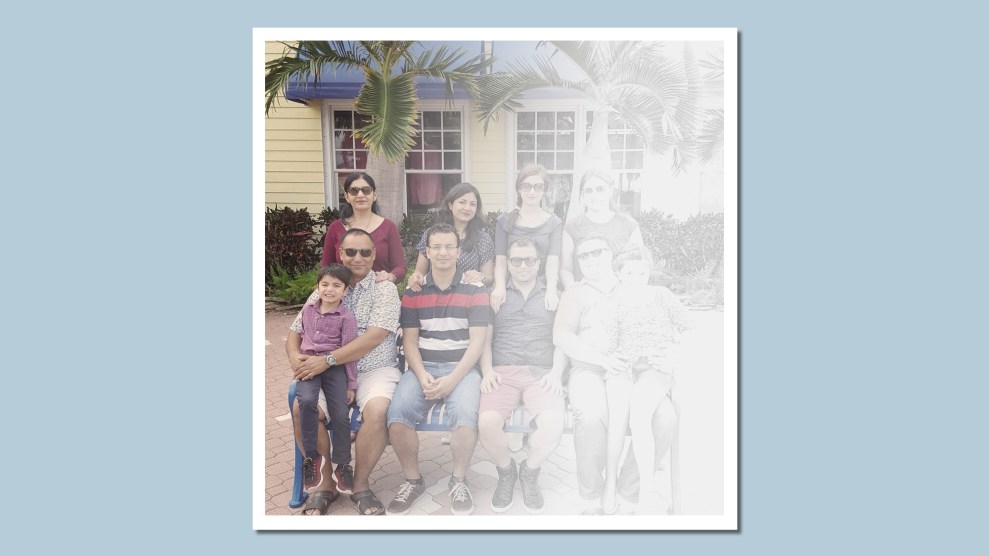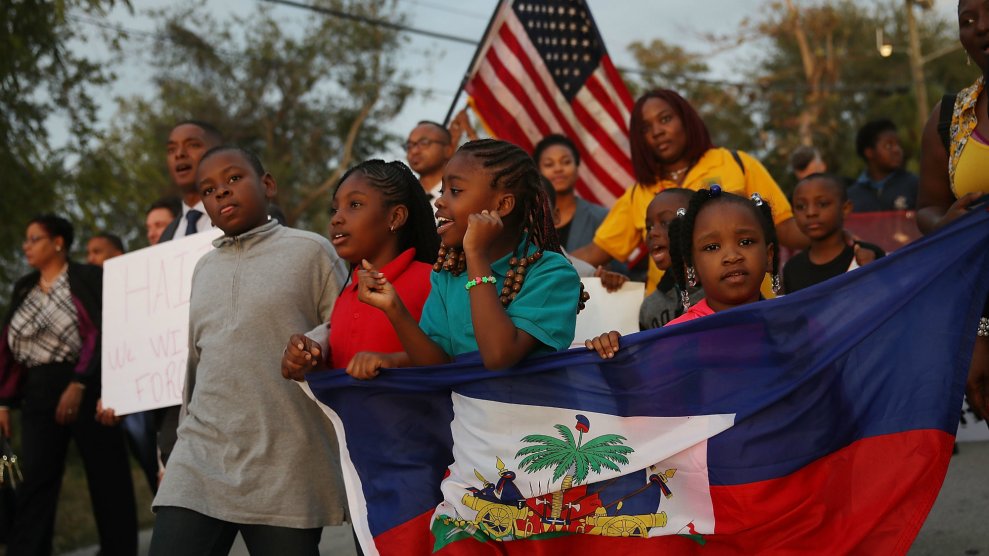
Keshav Bhattarai (left) with his family in Florida.Mother Jones; Courtesy Keshav Bhattarai
When Keshav Raj Bhattarai and his wife came to the United States in May 2015, they left behind a city where roads had cracked in two and historical landmarks had collapsed into rubble. It was just a few weeks after a 7.8-magnitude earthquake had devastated their home in Kathmandu, Nepal. They planned to stay in the US for about a month, spending time with family and watching their son graduate from a medical fellowship program in Pittsburgh. But that June, the Obama administration announced that Nepalis were eligible for Temporary Protected Status, a special legal protection that allows people from certain countries grappling with the aftermath of a natural disaster or other catastrophic event to live in the US. Bhattarai and his wife promptly applied, becoming two of about 15,000 Nepalis to obtain the legal status.
That all changed abruptly in April 2018, when the Department of Homeland Security announced it would be ending TPS for Nepal, effective June 24, 2019. The move was part of a larger pattern for the Trump administration, which has greatly restricted both legal and illegal immigration—including by saying it will end TPS for six of the 10 countries that currently have it, upending the lives of more than 300,000 people.
“It made me really sad,” Bhattarai recently told me through an interpreter, sitting on a couch in the Bay Area apartment where he’s been living for a little more than a year. “It seemed quite unfair that we only had TPS for such a short amount of time. I understand it’s temporary, but a few years is not enough for a country to rebuild.”
Now Bhattarai is one of eight plaintiffs named in a class action suit to stop the Trump administration from ending TPS for Nepal and Honduras, claiming that conditions in the two countries haven’t improved enough to justify ending their legal protections and that the decision to end the program was motivated by racism.
Their argument is modeled on a similar lawsuit filed by TPS holders from El Salvador, Haiti, Nicaragua, and Sudan, which won a preliminary victory in October 2018 when a federal judge temporarily blocked the Trump administration from ending the program for those four countries. Late last month, the Trump administration extended protections for those countries until January 2020 to comply with the court order.
But that ruling doesn’t cover Nepalis, whose status is set to expire in just a few months. It also doesn’t help Hondurans, who were granted TPS back in 1999 after Hurricane Mitch and are scheduled to lose their protections in early 2020. (Recipients from those two countries found out they’d lose TPS after the other TPS lawsuit was underway.)
If the new suit fails, thousands of Nepalis and Hondurans will soon have to choose between becoming undocumented or uprooting their lives. In many cases, they have US citizen children who’ve never even been to their parents’ home countries. Others, like Bhattarai, are just at the beginning of building their lives in the US. If they return home, the suit claims, they’ll face an uncertain future in countries that still haven’t finished recovering from the catastrophes of the past.
“I have a lot of love for my homeland, and we want to see it rebuilt,” Bhattarai says. “But I think the grounds for the termination were not fair.”
Bhattarai vividly remembers the beginning of his long journey. He tells his story matter-of-factly, sitting with his hands in his pockets as the sun shines into the Sunnyvale apartment he shares with extended family. It’s a clear, bright Monday afternoon in February, and Bhattarai, a round-faced guy with a warm smile, is still optimistic—wearing sweats and a purple t-shirt that says, “Washington DC: Our Nation’s Capital.” A Nepali flag is pinned to the wall behind him.
He tells me that a few minutes before noon on Saturday, April 25, 2015, he’d just finished a meal at home in the Chabahil neighborhood of Kathmandu, Nepal’s capital city, when the ground started shaking violently. Bhattarai, whose wife was out for the day, looked out the window and saw buildings moving all around him. He had to jump from the roof of his house to get to safety. “I just remember feeling so trapped and helpless,” he says.
When his wife returned, walking four miles to get back home because the local roads had been destroyed, she found a badly damaged house. That night, they set up a makeshift tent outdoors. The phone lines and electric lines were down, he says, and they had no running water. They ended up having to live in the tent for about a month, feeling the quake’s aftershocks daily—some as large as 7.3 magnitude. In the end, the earthquake killed nearly 9,000 people, injured 22,000, and severely damaged or destroyed more than 750,000 homes.
After that first month, Bhattarai and his wife traveled to the United States on six-month tourist visas. A month later, in June, when Nepal was designated for TPS, their son encouraged them to apply. TPS seemed like a great opportunity, Bhattarai says, and it didn’t feel like a stable time to return home. Besides, he recalls how excited they were to spend more time with their family in the US.
They received TPS and eventually moved to Florida, where their son had started a new job. In December 2017, Bhattarai traveled to Sunnyvale to visit some family there. He liked California so much that he ended up staying, eventually finding work at a Chevron gas station. His wife remained in Florida to take care of their grandkids, who are now ages six and one-and-a-half. Bhattarai visits them a few times a year, and once they came to see him California.
In Nepal, meanwhile, recovery was moving slowly. Bhattarai saved a few dollars here and there to send back home, but it wasn’t clear how much difference it was making. Civil unrest delayed the rebuilding process, and a border dispute between India and Nepal in 2015 and 2016 made it harder to deliver supplies for reconstruction. In 2017, severe flooding in the country’s southern plains region strained Nepal’s resources even further.
For these reasons, human rights advocates were urging DHS to extend Nepal’s TPS status. Though TPS needs to be renewed every 18 months, previous administrations have extended the status for various countries repeatedly, taking into account intervening conditions that might make it difficult to recover from a disaster. Honduras, for instance, had its status renewed every 18 months for two decades because of political crises, economic troubles, and other natural disasters that delayed the country’s recovery. The Obama administration extended TPS for Nepal in 2016.
Shortly before it was up for another renewal, in April last year, 23 US senators wrote a letter calling on the Trump administration to extend protections for Nepal. “Even today, as the country works to rebuild its infrastructure and restore housing to previous levels, the situation remains perilous,” they noted. A report last year from Adhikaar, a New York-based Nepali advocacy group, and the Catholic Legal Immigration Network concluded that “conditions in Nepal remain dangerous and unstable with no possibility of the country being able to safely absorb TPS holders.”
The Trump administration still ruled not to renew TPS for Nepal.
Ever since getting TPS, Bhattarai had been afraid of that outcome—carefully following the news, nervous that something would change and he’d have to live in the US undocumented or be forced to return to Nepal.
“It hurts me a lot to realize that this big, powerful, rich country that we thought was so welcoming would take away something like TPS,” he says.
After coming to the US, Bhattarai got involved with the advocacy organization Adhikaar. Through the group, he heard about a lawsuit to stop the Trump administration from ending TPS for Nepal and Honduras, and he decided to join.
In their complaint, filed last month, Bhattarai and five other TPS recipients and two of their US citizen children argue that DHS didn’t adequately take into account conditions in Nepal and Honduras before making its decision to end the program. Unlike previous administrations, they say, the Trump administration has refused to take into account intervening conditions that can make a country’s recovery more difficult, like the 2017 flooding in Nepal. They argue the DHS decision-making process was designed to result in Trump’s desired outcome. For instance, US Citizenship and Immigration Services Director Francis Cissna complained that one early memo explaining the decision to end the program didn’t “adequately support the proposal to terminate TPS.” And though another draft of the decision described it as a “close case” and referenced the 2017 flooding, the published version included no such language.
“Recovery from the earthquake is not over,” says Minju Cho, an attorney at Asian Americans Advancing Justice in Los Angeles, one of the legal groups representing Bhattarai and other plaintiffs. “As a result of that and other major events that have happened since then, it’s not sufficiently safe or stable to return.” At the end of 2018, Nepal’s government reported that only 45 percent of houses had been completely rebuilt.
The lawsuit also cites various comments by President Trump as evidence that the administration’s decisions to end TPS have been motivated by racism, including an incident from last year in which he complained about accepting TPS holders from “shithole countries,” saying he’d prefer immigrants from Norway. The complaint says Trump has disparaged people from South Asian countries, citing cases in which he faked an Indian accent to imitate the country’s prime minister, as well as a Politico report revealing that the president once “mispronounced Nepal as ‘nipple’ and laughingly referred to Bhutan as ‘button.'” It also references cases in which Trump has compared immigrants to animals and a tweet in which he said that Honduras, Guatemala, and El Salvador are “doing nothing for the United States but taking our money.”
This line of argument has already proved effective; the judge who issued a temporary injunction for TPS holders from El Salvador, Haiti, Nicaragua, and Sudan noted that plaintiffs had raised “serious questions” about whether the decision to end TPS was motivated by bias against “non-white, non-European immigrants.” The new TPS case has been assigned to the same federal judge in San Francisco, and lawyers are hopeful that he’ll make a similar finding for Nepalis and Hondurans. Cho notes the legal arguments in the two suits are structured the same way.
Bhattarai is trying not to think about what will happen if the suit fails. He doesn’t want to leave his family in the US, and he enjoys his work at the Chevron station, where he was recently promoted to assistant manager. If he and his wife return to Kathmandu, he doesn’t think they’d be able to live in their old home—they’d have to rebuild it or go somewhere else.
“I have trust in this country and its rule of law,” he says. “I have faith in what this lawsuit will lead to, that we will be able to get what we deserve. It’s really hard for me to imagine what I would do if we lost.”

















